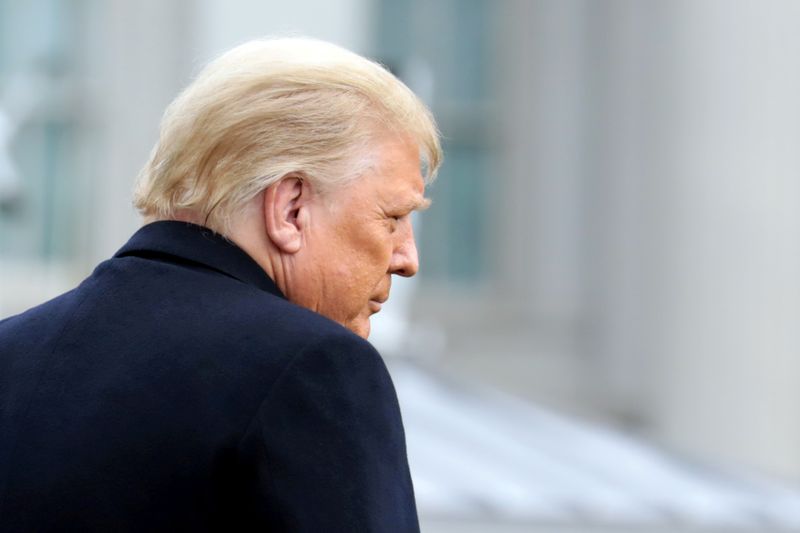By Steve Holland and Raphael Satter
PALM BEACH, Fla/WASHINGTON (Reuters) - Millions of Americans are about to see their jobless benefits expire on Saturday as U.S. President Donald Trump has so far refused to sign into law a $2.3 trillion pandemic aid and spending package, insisting that it did not do enough to help everyday people.
Trump stunned Republicans and Democrats alike when he said this week he was unhappy with the massive bill, which provides $892 billion in badly needed coronavirus relief, including extending special unemployment benefits expiring on Dec. 26, and $1.4 trillion for normal government spending.
Without Trump's signature, about 14 million people could lose those extra benefits, according to Labor Department data. A partial government shutdown will begin on Tuesday unless Congress can agree a stop-gap government funding bill before then.
After months of wrangling, Republicans and Democrats agreed to the package last weekend, with the support of the White House. Trump, who hands over power to Democratic President-elect Joe Biden on Jan. 20, did not object to terms of the deal before Congress voted it through on Monday night.
But since then he has complained that the bill gives too much money to special interests, cultural projects and foreign aid, while its one-time $600 stimulus checks to millions of struggling Americans were too small. He has demanded that be raised to $2,000.
"I simply want to get our great people $2000, rather than the measly $600 that is now in the bill," the president tweeted on Saturday.
His refusal to sign prompted sharp rebuke from Biden, who called on the outgoing Republican president to act immediately.
"This abdication of responsibility has devastating consequences...This bill is critical. It needs to be signed into law now," Biden, who is spending the holiday in his home state of Delaware, said in a statement.
Americans face an unprecedented holiday season amid a pandemic that has killed nearly 330,000 people in the United States, with a daily death toll now repeatedly well over 3,000 people, the highest since the pandemic began.
Many economists agree the bill's aid is too low but say the immediate support is still welcome and necessary.
'EXTRAORDINARILY HARD'
A source familiar with the situation said Trump's objection to the bill caught many White House officials by surprise. His repeated expression of discontent over it has dashed hopes that he would sign.
Trump spent much of Thursday and Christmas Day golfing at his club in West Palm Beach, Florida. The bill has been sent to Mar-a-Lago, his Florida residence.
On Saturday, Trump remained at his Mar-a-Lago club, with minimal staff but with members of his family, including senior advisers Jared Kushner and Ivanka Trump. According to his daily schedule, he was involved in "many meetings and calls", although the White House did not provide any details on those.
He has been sending tweets repeating his baseless claims about election fraud and accusing his fellow Republicans of abandoning him in his bid to overturn the election result, already shot down multiple times by U.S. courts. He is yet to acknowledge Biden's Nov. 3 victory.
Trump appeared to be in an isolated position on the aid bill as well, with few Republican lawmakers voicing support for his position. The White House had no updates as to whether Trump would sign the bill by Monday, an official said.
Representative French Hill of Arkansas, a Republican who sits on the House Financial Services Committee, told Fox on Saturday he hoped Trump would sign the bill at once because it would provide immediate relief to Americans.
"I wish he had made that pitch for $2,000 as vociferously over the last three weeks as after the bill was passed. It might have given us more leverage to get a slightly higher payment," Hill said. At this point, he added, "it's going to be extraordinarily hard to get that payment through the Senate and the House."
The U.S. Congress, which normally is adjourned the last week of December, will be preparing to return to work. The Democratic-controlled House plans to vote on legislation providing one-time, $2,000 checks to individuals.
Trump has also repeated his discontent over a $740 billion bill authorizing the nation's defense programs, a legislation he vetoed last week. On Monday, the House is scheduled to vote on overriding Trump's veto. If the House vote succeeds, the Senate could hold its vote as early as Tuesday.
